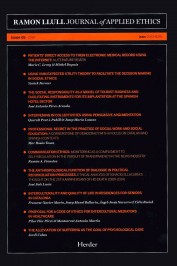PROFESSIONAL SECRET IN THE PRACTICE OF SOCIAL WORK AND SOCIAL EDUCATION1: A CORNERSTONE OF DEMOCRACY WITH A FOCUS ON CATALAN AND SPANISH CONTEXTS (p. 91-112)
Article Sidebar

Main Article Content
Mar Rosàs Tosas
University of Chicago
The aim of this paper is to examine the theoretical foundations of the professional secret and confidentiality in Social Work and Social Education in order to propose an alternative approach to the issue which does not reduce the professional secret to a utilitarian device designed to increase the success of social services. Our approach rests upon the idea that the professional secret not only protects the individual that has confided a secret, but also society as a whole, since intimacy and privacy are a necessary presupposition of all other human rights. Understood this way, the professional secret should be regarded as a cornerstone of democracy. The article therefore concludes by warning policy-makers and social workers and educators of the paradox inhabited by the professional secret: breaching confidentiality may be simultaneously an inevitable measure to safeguard society and a way to render society as a whole more vulnerable.
Paraules clau
Giorgio Agamben, Aporia, Confidentiality, Democracy, Duties, Professional Secret, Right to Intimacy, Right to Privacy, Social Education, Social Work, Vulnerability
Article Details
Com citar
Rosàs Tosas, Mar. “PROFESSIONAL SECRET IN THE PRACTICE OF SOCIAL WORK AND SOCIAL EDUCATION1: A CORNERSTONE OF DEMOCRACY WITH A FOCUS ON CATALAN AND SPANISH CONTEXTS (p. 91-112)”. Ramon Llull Journal of Applied Ethics, vol.VOL 1, no. 5, pp. 91-112, https://raco.cat/index.php/rljae/article/view/283990.
Biografia de l'autor/a
Mar Rosàs Tosas, University of Chicago
Full-time lecturer, University of ChicagoArticles més llegits del mateix autor/a
- Francesc Torralba, Mar Rosàs Tosas, Ethical deliberation within organizations , Ramon Llull Journal of Applied Ethics: Núm. 8 (2017): Issue 8
- Mar Rosàs Tosas, Political Emotions. Why Love Matters for Justice (Martha C. Nussbaum) , Ramon Llull Journal of Applied Ethics: Núm. 6 (2015): Issue 6